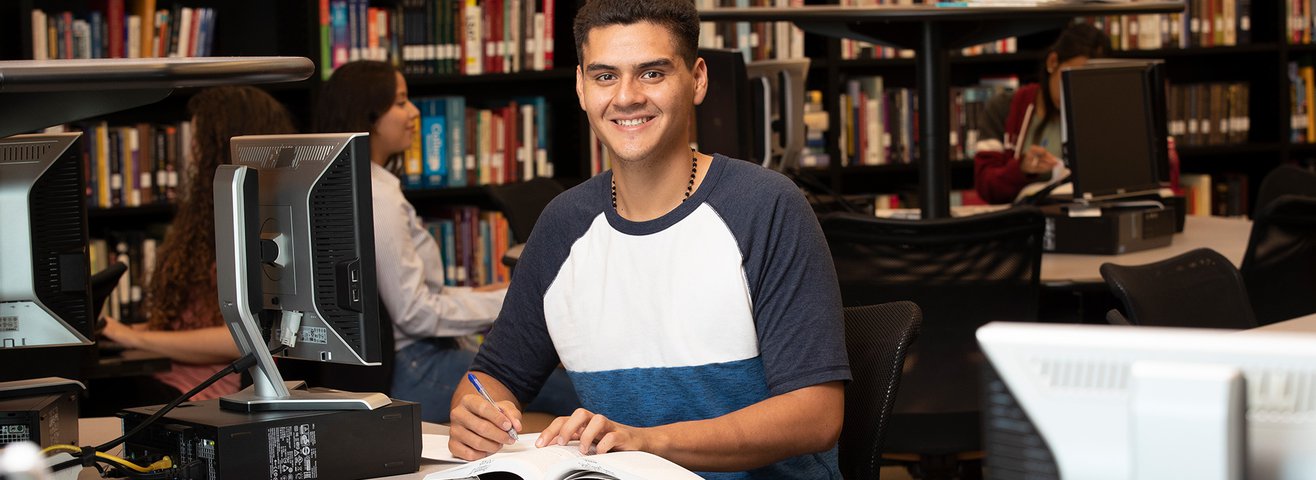
Students save $1.7 million in textbooks costs from CSUSB Faculty-Led Affordable Learning Solutions program
As the rising cost of higher education continues to burden college students and their families, they especially feel it with the soaring price tags of textbooks and learning materials.
Over the last 30 years, textbook prices have risen 800 percent, according to the Open Textbook Alliance, a nationwide coalition of student government leaders. The average cost of a science textbook is $250 and about 65 percent of students have opted not to buy a required textbook due to the cost, according to the alliance.
To help students, the California State University system created the Affordable Learning Solutions (AL$) program, which works with faculty to find ways to reduce course materials costs. The program, which is used at all 23 CSU campuses, including Cal State San Bernardino, saved more than $50 million in learning materials costs in 2018-19.
For CSUSB, AL$ has saved students more than $3.2 million since the program was launched in 2013. This year, 2019-2020, the program saved 13,117 students more than $1.7 million, or an average of about $132 per student. For classes, the savings is nearly $5,000 per course.
“AL$ affects the immediate challenges to students by reducing the cost of the textbooks and providing an affordable manner in which to acquire the materials thereby allowing the students to retain money for other expenses,” said Bibiana Diaz, the CSUSB program coordinator. “Long term this translates to over $1,731,726 in savings to our students through the support of the faculty.”
The program works with faculty to find lower cost educational materials, said Diaz, an associate professor in the CSUSB Department of World Languages and Literatures.
“The purpose of Affordable Learning Solutions is to encourage faculty to choose, adopt and provide more affordable, quality educational materials for our students, while at the same time enhancing the overall educational experience,” said Diaz.
Currently more than 30 departments in the university’s five colleges participate in the program.
The CSUSB AL$ project team is a joint university effort consisting of CSUSB faculty, Academic Technologies & Innovation (ATI), the John M. Pfau Library, the Coyote Bookstore, Services to Students with Disabilities, and administrative support, specially from Provost Shari McMahan, vice president for Information Technology Services and chief information officer Sam Sudhakar, and faculty associate of ATI Mihaela Popescu.
“Our goal is to help our students succeed academically and earn a degree. But we also want to help them find ways to reduce the financial burden of a college education,” said McMahan, who also serves as the vice president for Academic Affairs. “The Affordable Learning Solutions program is a wonderful example of our university community coming together to help our students.”
Through their participation, faculty members can take a more proactive approach that will help students in the classroom as they will be able to access, rent or buy more affordable textbooks and learning materials and ultimately move closer to graduation, Diaz said.
As an additional incentive, for participating in the AL$ program, faculty are eligible for $700 program grants, which can be used for professional development that includes conferences, teaching materials or equipment.
The AL$ program may have some additional impact as a result of the COVID-19 pandemic. The university has been forced to hold classes virtually in the spring quarter and summer session, thus creating an opportunity for faculty to find virtual resources and technologies to help in their teaching.
But Diaz said some of the strongest and convincing advocates for AL$ are students.
“When the students know that the faculty is helping them save money, they will go to other faculty in the same department,” Diaz said. “For example, say we have two classes in the same department. They are the same class. For one professor, the material is $40. This other one is $140. What do you think the students are going to choose which class to study?”
Melissa Osorio, who is the AL$ student ambassador, and currently enrolled in the teaching credential program, said it’s a great feeling knowing that she will pay less for her textbooks or sometimes nothing at all.
“I am so grateful for all of the faculty who take on the initiative to decrease students’ expenses in any way possible, including minimizing textbook costs, which at times ranges from $300-$500 per quarter, while still enhancing our educational journey with qualitative learning materials,” Osorio said.
“Affordable instructional materials and open educational resources encourage students to use the materials because they are often more relevant and up-to-date,” Diaz said. “And they give students the flexibility to access their course materials anywhere, anytime without having to have to carry around textbooks. And by reducing student course material expenses, more students acquire the course materials they need to succeed and ultimately benefit from their CSUSB learning experience.”


